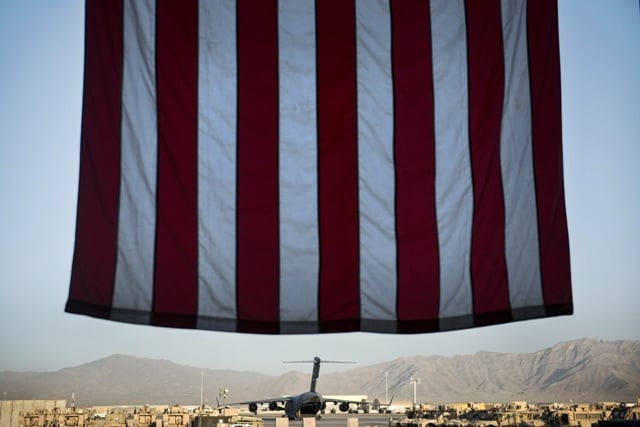Washington’s Afghan experience
The role which the US has played in Afghanistan has been quite elusive to be unequivocally explained

Mine resistant armored vehicles and other machinery waiting to be transported out of Afghanistan are seen in the background with a Boeing C-17 Globemaster III cargo plane at Bagram Airfield in Parwan on May 27, 2014. PHOTO: AFP
The role which the US has played in Afghanistan has been quite elusive to be unequivocally explained. The strategies which Washington had employed to achieve its objectives have raised a lot of questions and eyebrows. The very objective which the US-Nato set for occupying Afghanistan was to trounce al Qaeda in Afghanistan. In order to effectively achieve the objective, Washington thought it necessary to overcome the political-power vacuum in the country so that its territory could not be used by global terrorist organisations for attacks on the US mainland.
Noticeably, eliminating the Afghan Taliban has not been the key objective. The newly commissioned US strategy in Afghanistan also calls for weakening the Taliban on the battleground so that the group could come to the negotiating table. On a couple of occasions Americans did engage with the Taliban in direct talks through the latter front office established in Doha, Qatar. However, these negotiations for peace in Afghanistan could not make much headway due to a host of problems. In this regard Pakistan influence and the villainous role of the Afghan national security establishment led by its intelligence arm, the National Directorate of Security, prevented meaningful US-Taliban talks. While Washington has been critical of Pakistan, it has turned a blind eye on the role of the Afghan security establishment.
A huge war economy has evolved in Afghanistan and key members of the Afghan establishment have immensely benefited from it apart from the Taliban. On their part these officials do not want to see an end to the Afghan conflict and so do the Taliban. The US has been unable to deal with this huge war economy in Afghanistan while it has been trying aimlessly to deal with its repercussions. In this situation, the US limited its options in Afghanistan and had to resort to allout attacks on the Taliban.
Another very important aspect of the US dilemma in Afghanistan has been that despite significantly curtailing the number of its troops in Afghanistan and simultaneously increasing that of the Afghan National Security Forces (ANSF), the latter could not satisfactorily take over security responsibilities. It is after the withdrawal of most of the US-Nato troops from Afghanistan by December 31, 2015 that the Taliban could register a rare victory of taking over the province of Kunduz and nearly running over Helmand, another Afghan province, afterwards. This extremely poor performance of the ANSF personnel has forced the US to have second thoughts regarding the complete withdrawal from Afghanistan. Instead the US under President Donald Trump has been considering increasing the number of its troops yet again. The curtailing and increasing the number of its troops obviously demonstrates the faulty US strategy in Afghanistan. However, a closer look would reveal that the US has also had its compulsions.
Though the ordinary Afghans may be critical of the role of the US, it is more due to the immediate difficulties they have faced and in such a situation the blame always falls on the ‘other’. While analysing the situation in Afghanistan one must keep history in perspective. Before the descent of US troops on Afghanistan the country was greatly unstable though the Taliban were successful in establishing the ‘peace’ of graveyard in Afghanistan. Al Qaeda and global, regional and local extremist troops were taking fullest advantage of the power-political vacuum in the Taliban-ruled Afghanistan to carry out attacks in different areas of the world.
Regarding the US role it has been argued by certain quarters that the Afghans have come to consider the US as another imperial power intent to destroy the ‘Afghan way of life’ and exploit the natural resources. Whatever that is known as the Afghan way of life is profoundly a tribal social structure with its ultra-reactionary institutions. It is debatable that whether the US has been intent on putting an end to this way of life or not, but the modern state structure which the US has erected in Afghanistan naturally is an antithesis of it. Independently arguing for this the US must be appreciated rather than decried because it has been the Afghan way of life and its incompatibility with the spirit of times that has been the main cause of conflict and crisis in Afghanistan.
The social structure and the Afghan way of life have prevented Afghanistan from evolving into a forward-looking state, having strong institutions and a vibrant economy. This tribal structure has also had a huge bearing on the Afghan social psychology with supremacy very much on the minds of the ordinary Afghan thinking everything Afghan is good, while the world is out there to destroy their way of life and thinking.
In order to achieve its objectives, the US needs to learn from its mistakes and understand Afghanistan’s social dynamics.
Published in The Express Tribune, November 28th, 2017.
Like Opinion & Editorial on Facebook, follow @ETOpEd on Twitter to receive all updates on all our daily pieces.















COMMENTS
Comments are moderated and generally will be posted if they are on-topic and not abusive.
For more information, please see our Comments FAQ